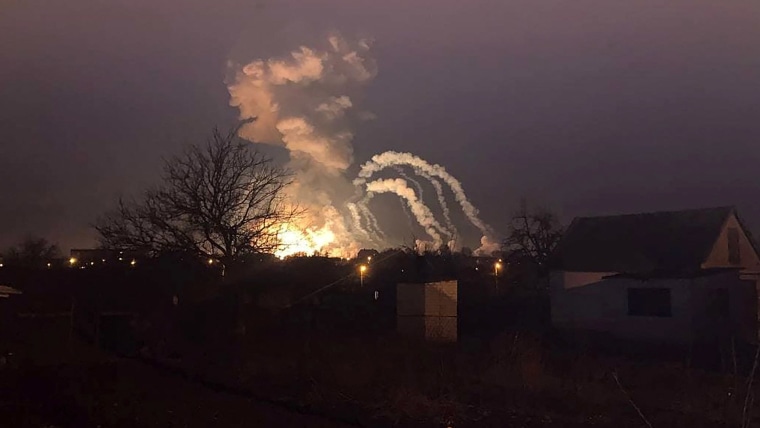Russian disinformation, propaganda ramp up as conflict in Ukraine grows



Link copied Feb. 24, 2022, 4:36 PM UTC / Updated Feb. 26, 2022, 3:06 PM UTC By Jason Abbruzzese
Russia's effort to spread disinformation and propaganda across the internet and through foreign and domestic media about its invasion of Ukraine started weeks ago — and it's expected to ramp up now that the conflict has begun.
Disinformation experts say that they have seen a concerted effort from Russian leaders and state-backed media to push a false narrative around the reasons for invading Ukraine, and that they expect that to continue as both international pressure and even some domestic Russian resistance to war grows.
"We're going to see a huge onslaught," said Jane Lytvynenko, senior research fellow at Harvard University's Shorenstein Center on Media, Politics and Public Policy. "And we need to be prepared for that."
Lytvynenko said people should be prepared for a wide variety of disinformation and propaganda, including the use of authentic images and video to push false narratives.
"We know that propaganda is a part of every war, and we know that after every attack we see a flood of propaganda," she said. "This propaganda can take many forms. It can try to take videos out of context and claim for them to be something else. It can show Russian attacks as more powerful than they actually were.
"They can create the illusion that Ukraine is not fighting back when it is. It will also play on gaps in knowledge on Western audiences in particular who have not been paying attention to a war that has been going on for eight years."

Scale of Russia's attack on Ukraine captured in pre-dawn explosions, bombed apartments
Feb. 24, 202200:58
Videos and images have already begun to pour out of Ukraine, many showing destroyed military vehicles and explosions. And during a conflict, disinformation and propaganda can also be a tool used by all sides. Some media that is circulating has been found to be recycled from other conflicts, including one post from a verified Ukrainian military Facebook page that posted what purported to be Ukrainian military action but appeared to be footage from a conflict in Syria in 2020.
Another misappropriated video, which showed a soldier parachuting out of an airplane, drew almost 20 million views on TikTok. The video is from a training exercise and was first posted online in April 2016.
Andy Carvin, senior fellow and managing editor of the Atlantic Council's Digital Forensic Research Lab, said news consumers need to be cautious in terms of drawing conclusions from unverified media coming out of Ukraine. He noted that it's easy for even well-meaning people to make mistakes and get details wrong that can easily spread quickly through social media.
"I feel like we're seeing a lot of stuff that has truth to it but is often coming in the wrong context," he said. "As people share footage, often the location can change from one city to another or the date gets mixed up or the description misinterprets what's going on."
Disinformation often conjures memories of the 2016 U.S. presidential election, when Russian bots pushed misleading and politically divisive claims on social media. But that will not necessarily be the playbook for the conflict with Ukraine, according to Ben Strickland, director of investigations at the Centre for Information Resilience, a nonprofit organization based in London that actively monitors disinformation campaigns.
Strickland said he's seen a shift in recent days away from Russian propaganda that sought to blame Western democracies and NATO for causing tensions and toward justifying an invasion of Ukraine. That has included disinformation and false accusations about fascists and neo-Nazis in Ukraine.
"From about Feb. 14 onward we started to see the use of the term 'Ukraine aggression,'" Strickland said. "This was specific keywords on Ukrainian aggression and a narrative echoed across all platforms, all Russian state-backed media outlets."
Strickland said that most of the disinformation his organization has tracked has not been pushed by the kinds of bot-driven social media operations that many think of in relation to Russian propaganda campaigns, but has instead been mostly focused on disseminating information on so-called false flag attacks (fake events meant to manipulate narratives) that have then been amplified by Russian media.
He said he's on alert for more staged events or Russian efforts to claim that any war crimes or atrocities were done by Ukrainians.
"I think what we are scared of is a much larger event whether it be children being killed, whether it be chemical weapons being employed and mass casualties and then seeing that used as 'Ukrainians are the terrorists,'" he said.
Stickland noted that these kinds of disinformation efforts are primarily meant to shore up support for military conflict within Russia, pointing specifically to the state-backed media outlet RT.
"You see this echoed in local news by RT, and that's where the thread is really tied to garner the support of the population of Russia," he said.
Lytvynenko said it's crucial for people to get information from people who understand the region and the conflict.
"When looking at information about these latest attacks, it's important to understand that context. Go follow reporters who are on the ground. Follow Ukrainians who are in direct contact with people there, and follow official statements from official channels," she said. "It seems like very basic advice, but it's really important now."
Carvin also said people in search of information should look to journalists and civil society organizations, and meet any information from Russian media and officials with a healthy skepticism.
"In any conflict there is a fog of war that affects everyone who has access to communication sources," he said. "And nowadays, that means all of us."
![]() Jason Abbruzzese
Jason Abbruzzese
Jason Abbruzzese is the senior editor for technology, science and climate for NBC News Digital.
Ben Collins contributed.



The US is now cracking down on Pro-Russian anti-American propaganda sreading on social media.
You know you nailed them when they call you silly.
Or, absurd...